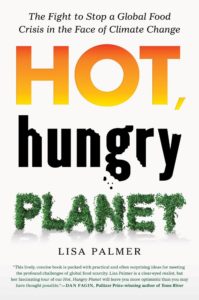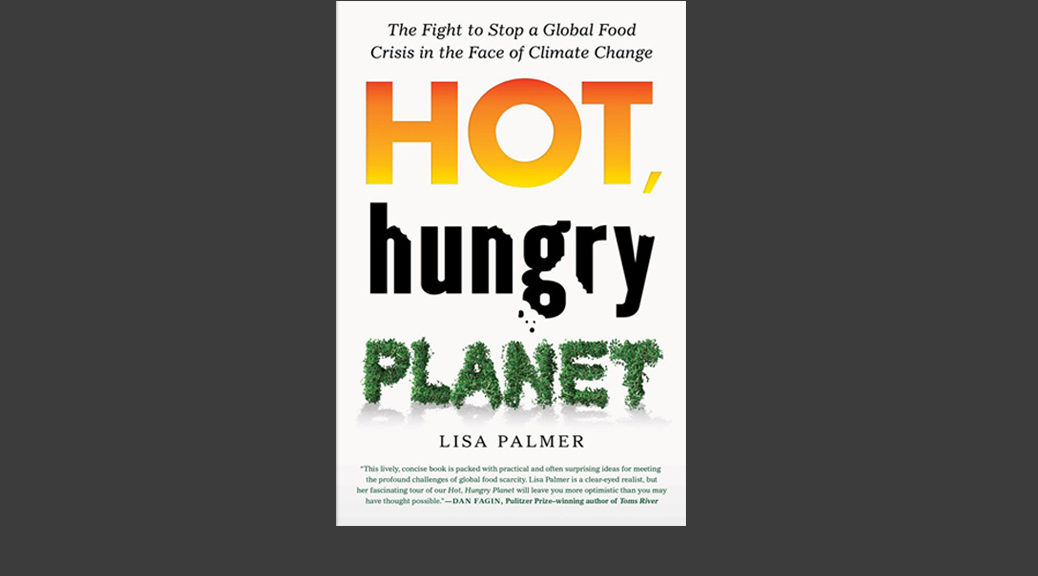
The world is on the cusp of a global food crisis. In only a couple decades, an additional 2.6 to 4 billion people will be sitting down at the global table wondering what’s for dinner. That’s the equivalent of adding another New York City each month to the world’s grocery lines for the next 35 years. In HOT, HUNGRY PLANET: The Fight to Stop a Global Food Crisis in the Face of Climate Change (St. Martin’s Press; On-sale: May 9, 2017; 9781250084200; $26.99) I address what needs to happen to reconcile two extreme global threats: climate change and global hunger. Christiana Figueres, diplomat and former executive secretary of the UN Framework Convention on Climate Change, says Hot Hungry Planet is, “A deep dive into the realities of some of the Sustainable Development Goals. Through moving personal stories Palmer shows how increased food security and addressing climate change are mutually reinforcing. We can and we must do both at the same time.”
Hot, Hungry Planet focuses on three key concepts that support food security and resilience in a changing world: social, educational, and agricultural advances; land use and technical actions by farmers; and policy nudges that have the greatest potential for reducing adverse environmental impacts of agriculture while providing more food. Palmer breaks down this difficult subject though seven concise and easily-digestible case studies over the globe and presents the stories of individuals in six key regions—India, sub-Saharan Africa, the United States, Latin America, the Middle East, and Indonesia—painting a hopeful picture of both the world we want to live in and the great leaps it will take to get there.
Early reviews:
“This lively, concise book is packed with practical and often surprising ideas for meeting the profound challenges of global food scarcity. Lisa Palmer is a clear-eyed realist, but her fascinating tour of our Hot Hungry Planet will leave you more optimistic than you may have thought possible.”―Dan Fagin, Pulitzer-prize-winning author of Toms River:A Story of Science and Salvation
“A penetrating and sensitive analysis of the urgent need for a sustainable global food system despite widespread socioeconomic inequality, swelling population, and ominous climate change.”― Richard C. J. Somerville, Ph.D., climate scientist
“The global food crisis is a critical issue. Producing more food is key but insufficient by itself. Palmer speaks in no uncertain terms about the peril we find ourselves in. But she also manages to find the bright spots―areas of hope that those of us in the environmental, business, and policy communities can address to cope with and even reverse some of the most alarming trends.”―Jason Clay, Senior Vice President, Food & Markets, World Wildlife Fund
“The time to talk about diet for the health of people without addressing the health of the planet is past. With inspiring examples of sustainable agriculture, thoughtful attention to matters as disparate as biodiversity and family planning, and precautionary tales from around the globe, Hot, Hungry Planet gives us a clear-eyed view of the perils we face, and the promise of overcoming them by truly understanding them.”―David Katz, M.D. President of the American College of Lifestyle Medicine and author of Disease-Proof, The Way to Eat, and The Flavor Point Diet
“A deep dive into the realities of some of the Sustainable Development Goals. Through moving personal stories Palmer shows how increased food security and addressing climate change are mutually reinforcing. We can and we must do both at the same time.”―Christiana Figueres, diplomat and executive secretary of the United Nations Framework Convention on Climate Change (UNFCCC), 2010-2016
“Hot, Hungry Planet is a sober analysis of the challenges and opportunities that lie ahead in feeding a changing and growing world. Palmer takes her readers on a journey from Vermont through Colombia, India, and the shores of Lake Victoria, examining innovations for sustainable and climate-resilient agriculture all along the way. Her work trumpets the benefits of smaller, more varied systems of food production that increase yields without the ecological harms of monoculture. Above all else, Palmer pens a passionate plea for the inclusion of women in all levels of food production through education and smart investments that forge a path toward a planet that can feed itself in a hotter, more crowded future.”―Shenggen Fan, Director General of the International Food Policy Research Institute


